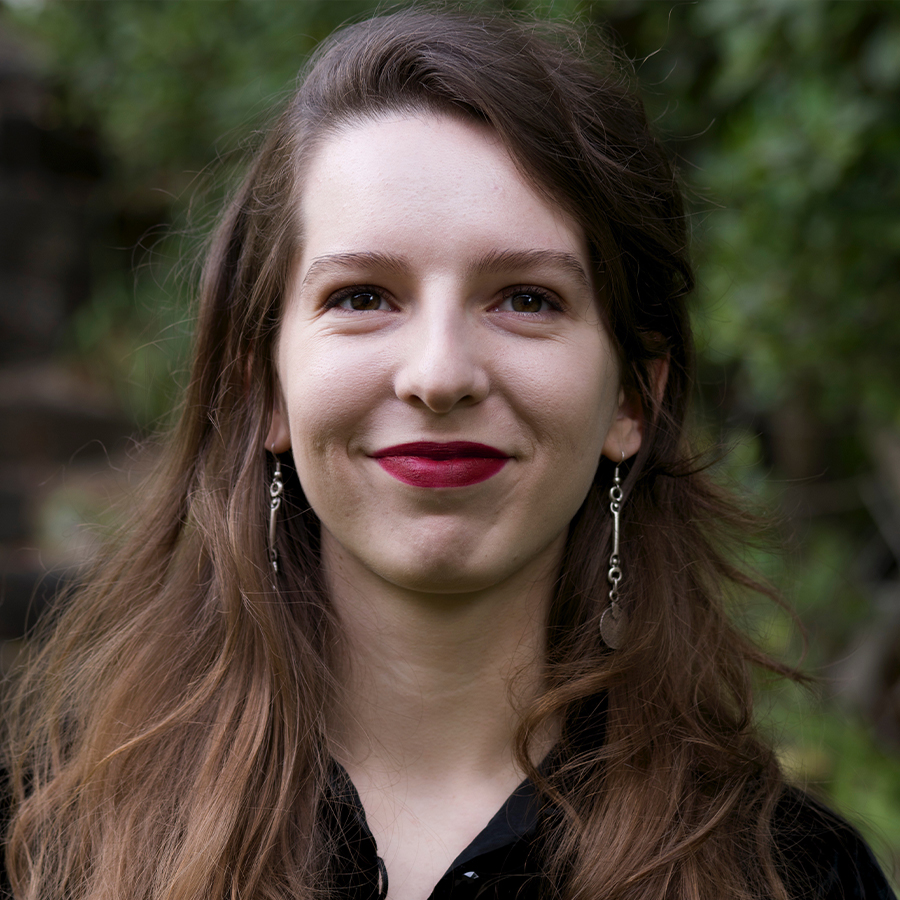
With a Master of Fine Arts in writing, Marin Sklan (Master of Environmental Studies ’24) turned her creative talent toward a career in marketing. When the COVID-19 pandemic began, however, she was overwhelmed by the drive to make a change. “Seeing how connected our world is, watching the administration roll back ESG protections, and understanding the implications of supply chains—something I hadn’t really thought about at that point—I realized I needed to make a pivot,” recalls Marin. Penn’s Master of Environmental Studies (MES) prepared Marin to put her communication skills to work in the field of environmental sustainability—while allowing her to continue working full-time as she completed her degree.
Marin tailored her degree with a concentration in environmental sustainability, which gave her deeper insight into global supply chains and ESG, or environmental, social, and governance—the three pillars of sustainable business practices. “I was so appreciative of the different topics I was introduced to. I was able to see how much opportunity is actually out there in the sustainability space,” she says. “There are so many pragmatic business benefits of operating in a more sustainable way. It’s more efficient. Your costs go down. You are able to reduce your business risk.” Although it could be challenging to fit in courses around her work schedule, Marin says, her interest in the material made her coursework feel more energizing than not. “The coursework invigorated what I was able to bring to the work I was doing professionally as well, especially when I made the switch to EcoVadis,” she reflects. “There was a beautiful synergy between my school life and the work I was doing.”

Marin’s coursework opened a pathway toward bringing her marketing expertise to EcoVadis, a purpose-led company headquartered in France that helps guide businesses—including recognizable global brands—toward ethical and sustainable procurement and supply chain practices. “This is where the foundational environmental sustainability courses were really, really important,” she says. “Once I got to the point of having discussions with customers, I was already plugged into all of the different regulations, international guidelines, and good sustainability frameworks. I had a much deeper understanding of what our customers are experiencing. I felt more comfortable with the different avenues in which businesses and supply chains build resilience, which helped me anticipate how we can better respond to customer needs. It was all really valuable information.” Marin was able to balance her new role with her coursework—including extracurricular activities, like installing pollinator hotels in the Penn Park Orchard, supported by a Green Fund grant.
While sustainability courses helped Marin transition into a field that gave her a sense of purpose, the program’s flexibility allowed her to pursue her curiosity in a wide range of topics. She took a course on environmental policy that was taught by a lawyer for the Environmental Protection Agency, which provided Marin with an overview of US regulations and their complications. A course titled Contaminated Site Investigation, Remediation and Long-Term Stewardship explored the impacts of business-induced environmental disasters. She signed up for a course called Wetlands out of curiosity—and it ultimately led to the next chapter of her environmental education. “We were out in the field around Pennsylvania and New Jersey, and it was my first time seeing how beautiful and intricate these ecosystems can be,” she recalls. She followed up this hands-on experience with Field Ecology of Puerto Rico, which involved a trip to the island for field work. Another course took Marin and her classmates to Senegal for the World Water Forum, the largest conference for global water issues.
Packed into a van with her classmates, watching the sun rise over the delta in Senegal, Marin realized that she could combine her creative writing experience and her fascination with wetlands. “The threads were starting to come together,” she recalls. She applied to submit a creative capstone project for her MES degree, and set to work researching wetlands around the world—including Senegal, Ireland, Austria, and England. Opening with a chapter about the local wetlands she explored in her first course in the subject, she offers an introduction to what wetlands are like and why they matter. In each of the eight chapters, she focuses on specific wetlands conservation projects, how different parts of the world are impacted by climate change, and different ways we have of valuing these unique environments—from trade and ecotourism to ecosystem services and carbon sequestration. “The thesis is that wetlands are incredibly powerful tools in helping mitigate the climate crisis,” explains Marin. “This was my attempt to introduce an audience to an overlooked part of the climate discussion and provide a compelling case for the value wetlands can offer.” Her project earned her the Frederick N. Scatena Award for Excellence in Research, awarded at graduation by Penn’s Department of Earth and Environmental Studies.
Now in possession of a manuscript in addition to an Ivy League degree, Marin is pitching excerpts for publication and looking for a publisher. She and her partner are planning to relocate to Germany, where she will be able to continue her work for EcoVadis—“ESG is super important in the European Union,” she notes. For prospective career changers like herself, who are seeking ways to parley a humanities background into an environmental career path, she advises patience. “Trust in the process. There is so much rich experience and ways of thinking that I’ve been able to bring into my work and guide my career pivot. And sustainability is a hot topic that will only become more important, regardless of tremors in the market,” she concludes. “Having people who can contribute from different backgrounds is critical, because there are so many applications for sustainability. And the work we do in any capacity is so essential.”



